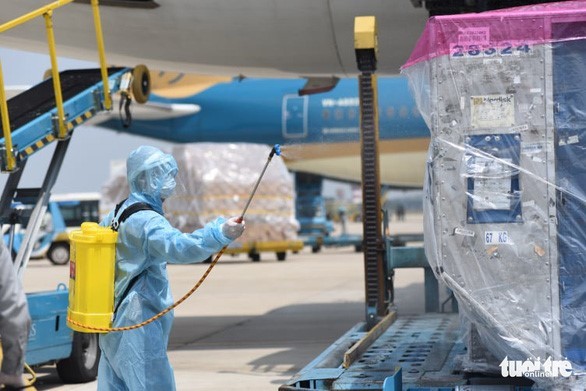(VOVWORLD) - The first batch of 117,600 doses of Oxford/AstraZeneca's Covid-19 vaccine arrived in Ho Chi Minh City's Tan Son Nhat Airport on Wednesday morning.
 Deputy Minister of Health Truong Quoc Cuong (holding the Vietnamese flag), a representative of the British Consulate in Ho Chi Minh City (holding the British flag) and representatives of the importing company at the airport receiving the first vaccine batch. (Photo: tuoitre.vn) Deputy Minister of Health Truong Quoc Cuong (holding the Vietnamese flag), a representative of the British Consulate in Ho Chi Minh City (holding the British flag) and representatives of the importing company at the airport receiving the first vaccine batch. (Photo: tuoitre.vn)
|
The Vietnam Vaccine Joint Stock Company (VNVC) has been permitted by the Ministry of Health to receive, preserve and distribute COVID-19 vaccines across the country.
The company has set up cold storage units in Ho Chi Minh City, Da Nang and Hanoi to store three million doses at a time.
This is the first batch of the vaccine that Vietnam has imported from AstraZeneca.
Deputy Minister of Health Truong Quoc Cuong said that the first batch of vaccines has arrived just on time for the prevention and control of epidemic in Vietnam. Although the whole country has made great efforts, it is necessary to vaccinate people against COVID-19 to create community immunity and achieve the dual goal of fighting against the epidemic and developing the economy.
 A worker disinfects the vaccine container. (Photo: tuoitre.vn) A worker disinfects the vaccine container. (Photo: tuoitre.vn)
|
Vietnam has reached a deal with AstraZeneca to purchase 30 million doses of its vaccine in the first half of 2021.
It has also reached an agreement with COVAX, a facility co-led by the World Health Organization (WHO), GAVI, the Coalition for Epidemic Preparedness Innovations (CEPI), to receive another 30 million doses of the AstraZeneca vaccine.
The Ministry of Health has said health care workers and others involved in fighting COVID-19, diplomats, and customs and immigration officers are among the priority groups in Vietnam’s vaccination plan.
Other groups included in the plan are army and police forces, teachers, people over 65, people who provide essential goods, people with chronic diseases, people who work or study abroad, and residents of pandemic-hit areas.